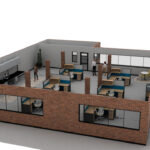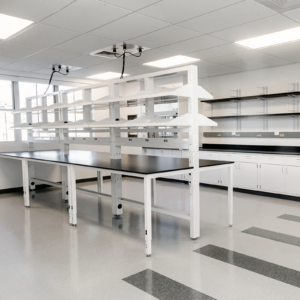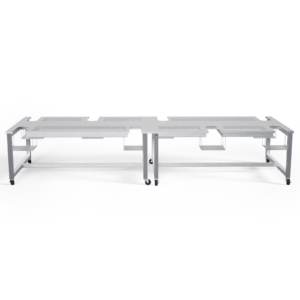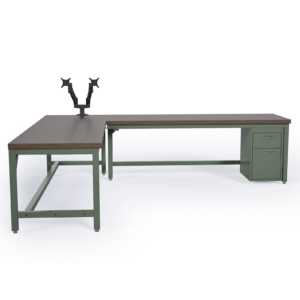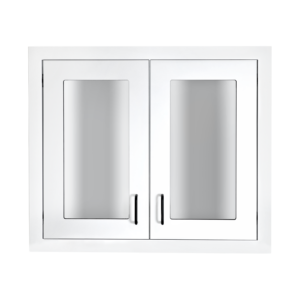In the laboratory field, there is a major trend underway toward modular lab furniture, yet many assume that modular designs are more expensive than traditional fixed casework. We investigate the facts about modular versus fixed casework.
In this brief buyer’s guide, we uncover the many reasons that modular laboratory furniture is becoming more popular — such as modular furniture’s lower installation costs — which generally make it less expensive than fixed casework projects.
But before we jump into the side-by-side comparison, we want to be clear: Formaspace sells BOTH modular lab furniture AND fixed casework. We’ve got you covered either way.
In fact, we recently completed the construction of the largest food and diagnostics lab in the U.S. at Fort Sam Houston in San Antonio, Texas for the Department of Defense’s Food Analysis and Diagnostic Laboratory (FADL).

So if your preference is for fixed casework, there’s no doubt about it — we have the solution you need.
But modular furniture is coming up fast, so we’d like to share with you what we’ve learned from over 30 years of experience in working with laboratories, and why the market is making the move to modular furniture designs.
Our research and experience show there are four key points to consider when deciding between fixed casework and modular furniture.
Point 1: The Lab You Build or Renovate Today Will Evolve Considerably During its Useful Life
Constant change is the watchword in today’s modern life science and research laboratories. In particular, lab designers should pay attention to these three:
- changes in technology
- the hunt for scarce talent
- major real estate trends
First, a word about technology. It’s getting more sophisticated and powerful, often smaller, sometimes cheaper (but not always). At the same time, the continuous rollout of new technologies is leading many to reconfigure their lab facilities far sooner than they anticipated in order to keep pace with the latest scientific advances.
The big advantage of modular lab furniture is that it simplifies re-configuring your lab. With modular furniture you can move cabinets around — even change your entire floorplan — to improve traffic flow, accessibility, etc. Modular furniture also allows you to easily increase your storage density by adding more shelves and cabinets to your existing installation.
On the other hand, fixed casework makes it much more difficult to change anything about your lab layout. Even small alterations can result in complicated, time-consuming, and disruptive construction projects.
As the healthcare, life sciences, and research industries continue to grow, recruiting top talent has become another concern that lab designers and space planners need to take into account. As in other tech industries, the best and brightest graduates have new ideas about how they want to collaborate in the workplace, as exemplified by the emergence of non-traditional.
Real estate trends are another important consideration. In the established life science research clusters like Boston, Raleigh-Durham, New York / New Jersey, the Bay Area, Los Angeles, and San Diego, occupancy rates are very high, which has driven up commercial rents for lab space to new highs. At the same time, mergers and acquisitions are on the increase.
The upshot is that if your lab has a favorable lease (or you own your real estate), you may be facing increasing pressure to accommodate more people and equipment in your existing location due to the high cost of relocation or expansion. In this case, modular furniture solutions make it far easier to increase the efficiency of your current setup. It’s very straightforward to add new workspaces and additional storage components, which is difficult to achieve with traditional fixed casework.
CONCLUSION 1: To keep up with technology, talent, and real estate space planning trends, modular lab furniture has the advantage of flexibility because re-configuring your facility is much easier compared with traditional fixed casework designs.
Advantage: Modular
Point 2: Chances are Increasing that Your Entire Lab Operation Will Need to Move to a New Location One Day
A report on trends in the life sciences market by the real estate consultancy Jones Lang LaSalle (JLL) confirms that overall growth, along with industry consolidation and globalization, is resulting in shortages of available high-quality lab space in the key life science clusters around the nation.
In the Cambridge / Boston area, which has the highest concentration of laboratory research activity in the U.S., the real estate consultancy CRBE reports that lease rates are at a record high and there is little inventory for expansion.
This phenomenon is replicating itself across the nation. As a result, many laboratory research companies in major cluster centers like Cambridge / Boston, the Research Triangle in North Carolina, San Francisco, and Los Angeles are now actively looking at:
- renovating non-traditional buildings to build out new laboratories
- relocating to suburban locations where rents are cheaper and space is available
- moving away from expensive cluster cities to secondary markets, such as Philadelphia

So you ask, “what does this have to do with the choice between modular furniture and fixed casework?”
Quite a lot, actually.
High rental rates are increasing the chance that your lab might need to move to a new location when a lease ends or you reach the point where you can’t expand internally. And if you ever have to move, the choice in favor of modular furniture becomes very clear.
Moving a fixed casework laboratory to a new location is difficult at best. You can’t remove built-in furniture without damaging the walls. You can expect that all the work surfaces will be damaged during the removal process, requiring new replacements. In contrast, modular furniture can be disassembled, transported, and reassembled at a new location without a lot of hassle, cost, or time commitment.
And there may be a couple of other benefits as well. In leased property, the fixed casework installation is typically considered to be a leasehold improvement, which according to most traditional lease agreements means it stays behind with the building. On the other hand, modular furniture can be moved to a new location without penalty if you have written your lease agreement correctly.
Recycling is another consideration. Many firms moving to a new location want to achieve LEED certification for energy efficiency and sustainability. Since modular furniture can be moved to a new location and used again, it can qualify for LEED credits (for 100% recycling of building materials). Generally speaking, fixed casework can’t be moved very successfully, and it’s often at risk of ending up in a landfill instead.
CONCLUSION 2: While it was once unthinkable that laboratories would need to move before reaching the end of their useful life, that’s no longer the case due to changes in the real estate rental market. Compared to fixed casework, modular furniture is easy to relocate to new locations, which protects your initial investment. It’s also good for the environment and may help you earn LEED sustainability credits.
Advantage: Modular
Point 3: Cost is an Issue. As it Turns Out, Modular Designs are Often Cheaper than Fixed Casework Installations.
This point may take you by surprise.
The common wisdom is that fixed casework is always the cheapest solution. But the real answer is “it depends”. And more often than not, modular furniture costs less upfront.
How so?
It turns out that installing fixed casework on site is quite labor intensive, which drives up project costs considerably. In our experience, fixed casework installations cost upwards of 2 to 3 times more than modular furniture, depending on the size of the project.
Why is that? When you purchase modular furniture, most of the hard work has already been completed for you on the factory floor. As a result, on-site installations for modular furniture are considerably faster and incur far less labor cost.
So when you add up the cost to purchase the furniture and the labor required for installation, the balance often tips toward modular furniture as being the lowest cost solution, particularly for larger installations. In fact, as the size of the project increases the modular furniture’s total cost of ownership (TCO) advantage over fixed casework increases even more.
Aside from the potentially lower initial upfront cost, modular furniture offers built-in flexibility for revising your lab layout as your needs change. Or, if you need to pull up stakes and move your equipment to a new location, it’s a relatively straightforward process with modular furniture and nearly impossible to do so with fixed casework.
Not convinced? One of our Formaspace Laboratory Design Consultants can run the numbers and show you which approach is more economical for your project.
CONCLUSION 3: When you consider the cost of installation, modular furniture is often cheaper than fixed casework.
Advantage: In most cases, modular furniture is cheaper overall.
Point 4: Modular Furniture Can be Delivered Much Faster than Custom Fixed Casework, Often Many Weeks Sooner
The final consideration is the lead time for delivery. Modular furniture can be manufactured and shipped out to your location much faster than fixed casework. For example, we recently quoted two alternatives for a laboratory customer: one with modular furniture and one with fixed casework. On this particular project, the production time needed to manufacture a set of modular laboratory furniture was 2–3 weeks; shipping was 3–5 days. In contrast, the time needed to manufacture the equivalent fixed casework furniture set was 10–12 weeks — up to five times longer. Shipping transit times for fixed casework were longer as well, requiring 7 working days due to the larger size of the furniture. Finally, fixed casework installations take much more time — 1 to 3 weeks of construction compared to just 1 to 5 days for modular furniture installations.
Of course, each project is different. That’s why it’s important to contact your Formaspace Design Consultant to get an estimate on how much lead time you will need for the delivery of your new laboratory furniture. But in all cases, modular designs will have a shorter turnaround time compared to fixed casework.
Conclusion 4: Modular furniture designs require less lead time than fixed casework.
Advantage: Modular
Make Contact with Your Formaspace Design Consultant Today
You have questions. We have answers. We can run the numbers for you and determine which solution is more cost-effective so you can decide. It’s all part of our full-service laboratory furniture solution. Why not drop a line via email to one of our Formaspace Design Consultants today? We’ll be happy to share our wealth of experience and provide you with timely, straight-up answers to your laboratory furniture design questions.



